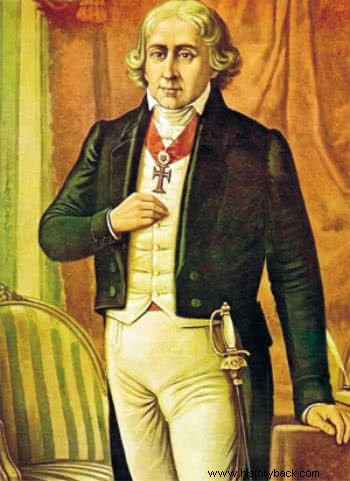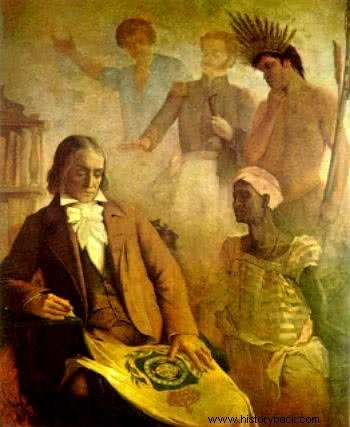José Bonifacio de Andrada e Silva was a Brazilian scientist, politician and statesman whose ideas and political influence were decisive for Brazil's Independence.

José Bonifácio with the Commendation of the Order of Christ
Education and Scientific Career
He was born in 1763, in the city of Santos, in São Paulo, to a wealthy family.
At the age of 20 he went to study at the University of Coimbra where he graduated in Law, Philosophy and Mineralogy. In 1790, with financial help from the Portuguese government, he is assigned to study in Paris and travel across Europe on scientific expeditions.
These trips give you the opportunity to get to know the main mines in Europe and the growing steel industry that was developing on the continent.
Throughout his life, José Bonifácio published several books on mineral formation, agriculture and politics, forming a library with more than 6000 copies. He taught at the University of Coimbra and was a member of the Lisbon Academy of Sciences.
In 1790 he married in Lisbon and the marriage would produce two daughters. José Bonifácio would still have an illegitimate daughter who would be recognized by him.
Return to Brazil and Political Career
He returned to Brazil at the age of 59 dreaming of opening factories in the country and rationalizing the exploitation of natural resources. However, his brothers convince him to run as a deputy for the province of São Paulo, in order to participate in the Constitutional Courts of Lisbon.
Freemason, he was Grand Master of the Loja do Oriente, places where critics of Portuguese power met. He founded the Apostolado, a secret organization, with the objective of promoting the independence of Brazil, from the government. He was against any type of popular initiative or rebellions that could compromise the Brazilian territorial integrity.
When Dom Pedro was Prince Regent, José Bonifácio convinced him that only with his leadership the Brazilian territory would not disintegrate as had happened with the countries of Spanish America.
He also argued that the presence of the Prince Regent would prevent a civil war between Brazilians. So he managed to attract the support of the deputies of São Paulo to the cause of independence led by Dom Pedro.
He was part of the Council of State which, together with D. Leopoldina, contested the decision that ordered D. Pedro to return to Portugal. Then, after Brazilian emancipation, Dom Pedro I appointed him Minister of Foreign Affairs and in this position he negotiated several treaties and the recognition of independence with foreign nations.
At this time, José Bonifácio, who was also a deputy, sought to influence with his liberal and conservative ideas, the elaboration of the Brazilian Constitution. He was very clear that Brazil should be a constitutional monarchy to guarantee the territorial integrity of the former Portuguese colony.
He read more about the Constitution of 1824.
However, D. Pedro I demands that the Emperor's role must be greater than that reserved in a Constitution. Due to these differences and the influence of opponents of José Bonifácio, in particular his position against slavery, D. Pedro I exiles José Bonifácio and his family in France in 1823.
This condemnation would end when D. Pedro I decided to abdicate the Brazilian throne to fight for the Portuguese crown. He forgives José Bonifácio and appoints him guardian of his children. In poor health and mentally unbalanced, Bonifácio retired to the city of Niterói, where he died in 1838.

José Bonifácio, the foundation of the homeland. Author:Eduardo de Sá.
Main ideas
Liberal and defender of the constitutional monarchy, José Bonifácio supported some ideas for the development of Brazil:
- defends the civilization of the Indians
- the gradual abolition of slaves
- creation of technical education schools
- land reform
- prohibition on foreign borrowing
- transfer from the capital of Brazil to a city at the head of the São Francisco River
Curiosities
- Discovered four new mineral species such as petalite and spodumene that contain lithium.
- Despite having entered history as a serious character, José Bonifácio liked to dance lundu and other African rhythms.
- There are several streets and statues erected in his honor in Brazilian cities.
- he is patron of chair nº 40 of the Brazilian Academy of Letters.
- He became known as Patriarch of Independence for his services to the nation.
Read more :
- Fique Day
- Causes of Brazil's Independence
